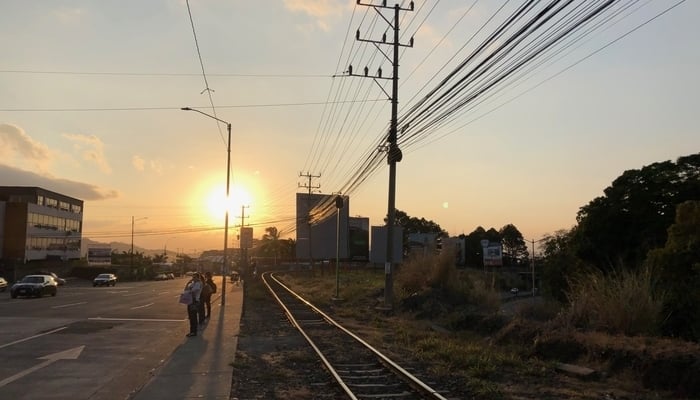Looking for stories of coronavirus hope can be a challenge in these incredibly stressful times. But there are reasons for optimism out there, including here in Central America. And we’re asking you to help us with your feelgood and positive stories, too…
Every day when I wake up I listen to BBC radio. I live in Costa Rica but I’m British and listening to the Beeb first thing in the morning is as ingrained into my psyche as eating gallo pinto is for Ticos.
The news nowadays, when I turn on the radio, is always grim. The UK surpasses 2,000 deaths from COVID-19, the disease caused by this coronavirus you might have heard is going around right now.
Then I turn on the Costa Rican news. More grimness. Not as bad as the UK, but not good. We’re now well over 300 cases.
And then I head to the US news for even more depression. The United States is now the global leader in coronavirus cases. Winning bigly.
It’s no wonder I’m rattled. We’re all rattled. And I haven’t even mentioned the impending global recession (depression?) that will kill or displace more people than coronavirus itself, as our jobs and incomes evaporate, and we end up living in cardboard boxes on the street.
I suppose I could get indignant. Last year – 2019 – was a rough year for me on a personal, health, and financial level. Much of it my own fault, but rough nonetheless. 2020 was meant to be about clearing the slate and starting over. Righting wrongs and all that. It wasn’t meant to be dominated by a killer cough named after a Mexican beer that’s going to wipe out the slowly recovering wreckage of my own being before I can really start starting over.
Who the hell saw that coming (apart from Bill Gates and those US lawmakers who dumped off their stock before the markets took a dump, that is)?
But whatever. Forget the pity party. I’m actually not indignant at all about this. Coronavirus is a great equalizer, sucking us all into a state of cathartic shock as we attempt to digest what we’re seeing in every single news cycle.
Barrage after barrage of bad news. These are truly the worst of times.
But wait.
Are they the worst of times? I mean I know things are bad and I know we’re all terrified. But shouldn’t we try to get a little perspective? Is this thing really the End Of The World As We Know It?
I don’t believe so. In fact, I see hope everywhere, both in terms of COVID-19 itself and even the type of society we can be on the other side of it.
Let’s start with the virus.
There are signs of hope out there regarding COVID-19.
For a start, let’s all remember this coronavirus is beatable and containable.
We need to know that. You turn on the news or go online and it’s the apocalypse. But around the world, for every Italy, there’s a Germany. For every Spain, there’s a South Korea or Singapore.
Coronavirus outliers: four nations with very different approaches to the crisis https://t.co/LG0SHQBoDB
— Guardian Science (@guardianscience) March 29, 2020
Germany has a very low mortality rate for COVID-19 but you rarely hear that in the news. So does Austria.
These countries are testing more people than Italy and Spain, finding more younger people with mild infections, which pushes down the overall death rate. The logical explanation here is that this illness is far more prevalent than we know about, with far more many mild cases that completely pass under the radar.
And although every death from this thing is tragic and I’m not in any way wanting to diminish the nightmare happening in Italy and Spain, when we’re able to retroactively test for coronavirus on a wide scale to see who’s had it without knowing and recovered, we’ll have a better sense of perspective about it, rather than the panic and global meltdown we’re seeing now.
The ability to pinpoint how many people already had COVID-19 without knowing it is key to beating it, both from a practical and a psychological point of view. We’ll know far more about the enemy and get a handle on its true mortality rate.
They’ve already started doing this on a small scale, so it’s possible. Outside of a vaccine (which will come, plus antivirals and other treatments to mitigate this thing), it’s a huge cause for hope in this crisis.
But we don’t talk about this. All we do is quote the horrific numbers we’re seeing out of countries like Italy and expect those numbers to replicate in our own countries. And there’s no reason why they should. Some countries are handling this well, and I count most of Central America in that.
The next frontier in coronavirus testing: Identifying the full scope of the pandemic, not just individual infections https://t.co/H45UzydoJS
— STAT (@statnews) March 28, 2020
Yep, that’s right.
Tiny, poor Central America is handling coronavirus well, for the most part. Much better than some so-called ‘first world” countries to the north, anyway.
Guatemala, Honduras, and El Salvador are all on lockdown, with nightly curfews. Panama is in a state of near-total curfew. Costa Rica has taken major measures to keep people at home, as has Belize. And people seem to be complying for the most part. Things will undoubtedly get worse before getting better, I’m under no illusions there, but I just can’t see, even in my worst nightmares, things getting apocalyptic here, at least not with the virus itself.
Put it this way, those who can, like Tom Brady and Giselle Bundchen, have come to this part of the world to ride out the storm. They clearly see Costa Rica as a safe haven in times of coronavirus and I think they’re right. I honestly don’t know if they’re still here or are planning to stay for the duration. It’s none of my business. But if I was them, I would, for sure.
Gisele Bündchen Sings ‘Count on Me’ with Kids in Costa Rica Amid Coronavirus, Shares Inspiring Message https://t.co/oHKJoqW2qh
— PeopleStyle (@peoplestyle) March 25, 2020
The real problems here in Central America – and this is what keeps me awake at night – will be economical.
We are poor countries and we rely on tourism. Some – like Costa Rica and Belize – more than others.
But in as much as they can, which admittedly, isn’t much, Central American governments are really trying to help, showing a concern for their citizens I haven’t seen in a long time, maybe ever.
The government of El Salvador leads the way here, with a ton of measures designed to help its citizens affected by the coronavirus, including a moratorium on mortgages, rent, loans, utility bills, credit card payments, and so on.
Other countries are also following up with measures to get people through this. Panama is postponing mortgage and loan payments until the end of the year. Guatemala and Honduras are both pumping money into the poor. Costa Rica and Belize will come out with some new measures this week (I hope).
Why do Central Americans love Nayib Bukele? https://t.co/Us0zjdaMXS
— CentralAmericaLiving (@VidaAmerica) March 30, 2020
Although many of these measures are meager, they’re something. And they’re a sign that most governments in this region – and around the world – no matter how strapped for cash they are, care about their citizens. I’m finding myself less cynical about all this, which is a sign of hope in itself.
Just as important as the public measures made by governments during this pandemic are the private efforts.
Over the past couple of weeks, I’ve seen many people and organizations become nicer, do nicer things, make nicer gestures.
From internet companies in Costa Rica giving customers a break to Italy/Spain-style singing and clapping from balconies in Guatemala City, the growing sense of community is palpable. The other day I had to go to Walmart and the attitude of the staff there, cheerily wiping down your cart with disinfectant, was admirable.
I’m seeing reports of people making masks for the elderly and people delivering dog food to desperate owners in need. Is it naive to say I’m seeing people be nicer? There’s a wonderful article this week published by Oxford University’s Practical Ethics Blog talking about this, and a new trend called (ugh) caremongering. Is it possible this is bringing out the best in us?
New Post: Prof Neil Levy discusses The Coronavirus: Signs of Hope? #unisupport #remarkableresearch https://t.co/FRyT9my5ei
— Practical Ethics (@ethicsinthenews) March 31, 2020
I’m talking here specifically about Central America, and even more specifically about Costa Rica, where I am, and where I’m experiencing this crisis. Over in the UK, and other countries, I keep hearing and reading about fistfights in supermarkets over toilet paper, about people coughing into other peoples faces on purpose, and all sorts of other scumbag shit. I have not seen or heard about anything like that here. All I’ve seen here is pure positivity.
It’s even made me believe in pura vida again, I can’t deny it.
Another thing I’m seeing is the rise of productivity among us, a heightened sense of innovation.
There’s nothing like the fear of complete destitution to make you more productive, right? A friend of mine – a successful businessman and entrepreneur – said the other day, as he was scrambling for ideas and thinking big to save his company, that in a funny, perverse way, he was having fun! It was like starting over again, fighting against the odds, being hungry.
Now I know that could sound offensive to people who really are hungry, people who, because of this, don’t know where their next meal is coming from, but I kind of get where he’s coming from.
It’s making him sharper and getting his juices going again. He never asked for or wanted this, but now it’s here, despite all the heavy stress he’s under, it’s making him thrive. In a funny, perverse way.
A lot more of us will have to get innovative. Get adventurous. We’ll have to step out of our comfort zones and learn new stuff. Otherwise, we’re going to sink. To me, that’s both terrifying and exciting.
But this crisis is going to be the making of many of us. There’s an opportunity here, an opportunity to make us nicer, smarter, more resilient, and less reliant on others.
“I don’t wish to diminish the scale of our present difficulties, but neither do I believe that the future is inherently gloomy. A world with more #kindness & creativity is one to look forward to.”#Coronavirus: The Good That Can Come Out Of an Upside Down World#interdependence https://t.co/XsVHPwBwa4
— Janna Weiss ☂️ (@RealJannaWeiss) March 31, 2020
So let’s recap why there’s hope in these times of coronavirus when things look so desperately bleak right now:
- This thing won’t last forever. China’s turned a corner – if you believe them, that is, and if you don’t, then…
- … Italy seems to be turning a corner, too. They’ve paid a heavy price, but they’re seeing green shoots. Spain’s numbers seem to be flattening a bit, and France’s. So do Costa Rica’s. And Washington State’s. Green shoots really do exist here.
- These green shoots exist due to the measures taken. It looks like a six-to-eight-week slog to start flattening the curve. We know how to beat this. Google “coronavirus hope” or variations of that and you’ll see reports from all over the world talking about how the measures are working.
- The mortality rate of COVID-19 won’t end up being anywhere near what everyone is saying. If you don’t believe me, look at the rates in Germany, Austria, Singapore, Japan, and South Korea. Ask yourself how they’re counting this. Most countries are only counting those cases serious enough to warrant hospital attention, not those who’ve had this and never even noticed. If we get an accurate figure, we’ll drive down the panic.
- Most people who get COVID-19 recover. Even those who end up hospitalized. Most leave hospital on their own two legs instead of in a coffin (to be brutally blunt). And the vast majority of people who have this don’t need hospitalization in the first place, and so in many cases aren’t even tested and counted in the numbers.
- The treatments they’re looking at, from existing antivirals to malaria drugs, to blood infusions from cured patients all show a lot of promise in the absence of a vaccine. Smarter people than you and I are working on this 24/7.
- Governments around the world, some later than others, seem to be coming to the table here. There seems to be a unified voice and most countries, including countries here in Central America, are handling this well.
- This pandemic is bringing out the best in us. We’re kinder and more tolerant. At least where I am, that’s what I’m seeing. We’re discovering a true sense of community again that maybe we lost over the years.
- We’re getting innovative again and looking to create our own solutions rather than relying on someone else.
- Science, baby! Seems like we’re believing it again, and virologists are the new rock stars. Man, if I was 15, I’d be thinking seriously about pursuing a career in scientific research and saving the world from the next pandemic.
The events of 9/11 drove me to my current career path. The #coronavirus pandemic is a similar, even more significant watershed event. My hope is that it shapes the career paths of our youth, leading talented/driven people to study epidemiology, infectious disease & health policy.
— Colin P. Clarke (@ColinPClarke) March 31, 2020
So this is what we’re looking for here at www.centralamerica.com. We want you to stay hopeful and believe this storm will pass soon.
Follow the advice, and it will pass. We’re going to be okay.
We want to hear from you, and report on what you’re doing to help save your country – Costa Rica, Panama, Nicaragua, Honduras, El Salvador, Guatemala, or Belize – during this time. Or tell us what others are doing. We want positive stories from around the region. We want stories of solidarity.
It’s time for positivity and kindness right now while we’re going through the worst of this, and uncertainty looms over us all. It’s time to stick together. So please, send us your positive stories and we promise we’ll report them and help where we can.
Perhaps the biggest coronavirus hope we can have is that yes, this is the End Of The World As We Know It. And the world that comes after this will be a better one for us all.
James Dyde is the editor of www.centralamerica.com. He lives in Escazu, Costa Rica.




